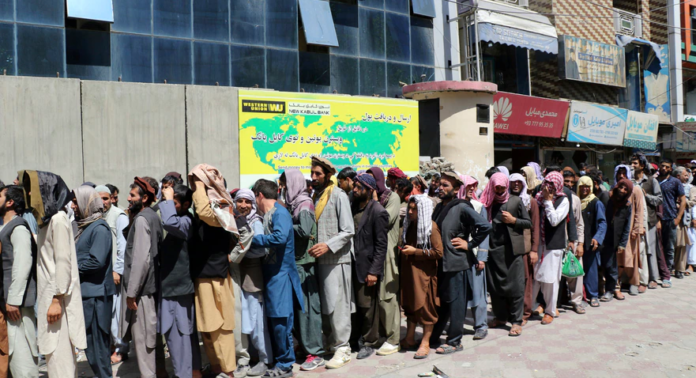LONDON: Afghanistan’s banks, which are crucial to the country’s recovery from the crisis, face an uncertain future, its bankers say, from liquidity to women employees after the Taliban came to power. Everything is doubtful till employment.
A Taliban spokesman said on Tuesday that banks were expected to reopen soon after they closed for some ten days and the financial system stalled as the Western-backed government collapsed amid the withdrawal of US and Allied troops. .
Yet with huge crowds on the streets outside banks in Kabul so far, there is little evidence of banking services returning to normalcy.
“Banks continue to remain closed – with no clear signs of reopening, they have run out of money,” said Ghazal Gilani, trade and economic adviser at the Afghan embassy in London.
“Afghanistan’s banking system is now in shambles, and people are running out of money.”
Many rural areas get largely without banks. But in cities, where salaries of government employees are often paid into bank accounts, the closure is causing hardship to a mostly cash-based economy.
With emerging questions about the Taliban’s understanding of finances and its ability to restart an economy shattered by a 40-year war, the outlook for lenders looks uncertain.
With no significant exports other than illegal narcotics bringing in cash, according to former central bank chief Ajmal Ahmadi, an immediate constraint is liquidity in a country that is heavily in dollars and reliant on regular physical dollar-shipments, which has been stopped.
The Afghanistan Bank Association (ABA), one of the three largest banks in Afghanistan, said Syed Musa Kaleem Al-Falahi, chief executive and president of the Islamic Bank of Afghanistan (IBA), the central bank to coordinate steps on a return to normalcy. had reached. .
He said the commercial banks had collectively decided to suspend services until the central bank confirms the liquidity and security arrangements.
“If banks open immediately, it will be difficult to control the crowd,” he said.
Liquidity was already an issue even before the bank closed as people scrambled to withdraw cash.
The Bank of Afghanistan (DAB), the central bank, provided financial support to banks during last week’s cash squeeze, the banker, one of Afghanistan’s biggest lenders, said on condition of anonymity.
But its ability to continue to do so appears uncertain, with the DAB’s nearly $9 billion in foreign reserves largely out of reach of the Taliban.
“Banks will face huge liquidity challenges as central bank officials do not yet have access to reserves,” the banker said.
“They will face foreign exchange liquidity issues leading to huge fluctuations in exchange rates.”
RARE DOLLAR
Afghanistan fell on expectations of dollar depreciation and further volatility is expected, with Afghanistan’s import coverage reportedly declining for more than 15 months.
Bankers in Afghanistan are also awaiting clarity from foreign-based correspondent banks, which provide services such as currency exchange and money transfers, on whether ties will continue after the Taliban takeover. Any new restriction could cut multiple links.
A senior Afghan banker said his bank’s correspondent banks in Turkey, Russia, Spain, the United Arab Emirates, Qatar, Pakistan and India are still showing support.
Trust in the banking system was badly damaged by the 2010 collapse of Kabul Bank, in one of the biggest corruption scandals of 20 years of Western presence in Afghanistan.
Banks emerged in generally good health from the COVID-19 pandemic, DAB said in its 2020 report, with no liquidity crunch, while capital conditions met regulatory thresholds and assets rose 4% to 327 billion afghani ($3.8 billion). ) happened.
But the current crisis will further undermine confidence in a sector that is struggling to expand services in a thinly banked country.
According to the International Monetary Fund, only 183 out of every 1,000 people have a deposit account; There are less than two bank branches or cash machines for every 100,000 adults.
CONCERN FOR FEMALE EMPLOYEES
This week, the Taliban said it has named Haji Mohammad Idris as the acting governor of the DAB, a loyalist without formal financial training. A senior Taliban leader defended the appointment, saying Idris is respected for his expertise.
It is not yet clear whether Afghanistan’s less than a dozen banks, all but one of which are traditional, will have to convert to Islamic banking, a lengthy and costly process.
More uncertainty surrounds the future employment of female employees.
“So far there has been no official communication from them (the Taliban) regarding the female employees,” said IBA’s al-Falahi. “Our female employees will return to work when we reopen.”
But given the track record of the Taliban, their assurances of allowing women to work in accordance with Islamic law have been met with skepticism.
The banker of one of Afghanistan’s biggest lenders said his bank has a plan to ensure it can continue operating in the event of the dismissal of about 20% of its female employees.
“We expect that we will face challenges like losing qualified and highly skilled workforce as most of them are planning to flee the country at the first opportunity,” the banker said.




